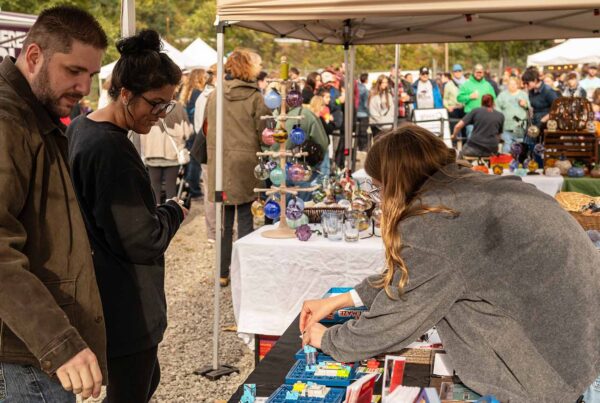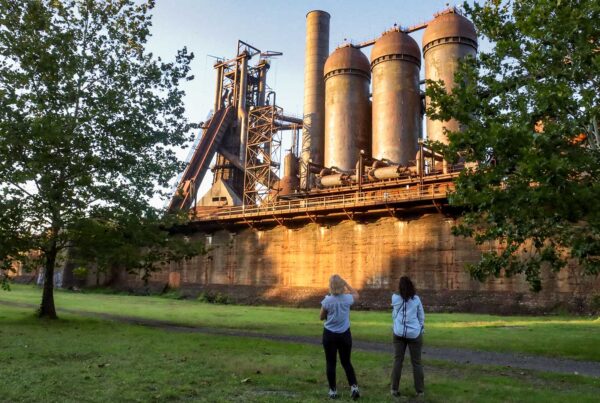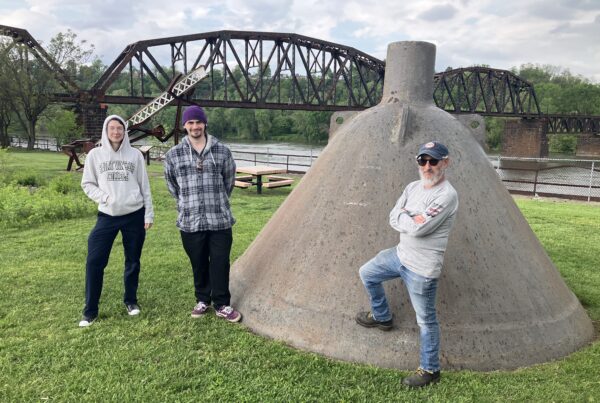
We Remember George Floyd: Rivers of Steel’s Call to Action to Ourselves and Our Region
Rivers of Steel condemns the murder of George Floyd. Starting today, we will work aggressively through our programming and projects to help put an end to racism, bigotry, inequality, intolerance, injustice, and prejudice directed toward black Americans and other people of color.
The Rivers of Steel National Heritage Area was created by an Act of Congress in 1996 to commemorate, interpret, and help conserve the industrial and cultural heritage of southwestern Pennsylvania. Over the years, we have proudly told the stories of the industrial might of Pittsburgh and the region, and how those companies and the hundreds of thousands of people that came here to work built America. We take pride in the fact that our industrial prowess and the sweat, brawn, and blood of the workers manufactured the armaments that defended democracy and won world wars. We see this heritage still reflected in the neighborhoods where we live, the houses of worship in which we pray. We celebrate our diverse ethnicity and tell stories about how our grandparents and great grandparents came to southwestern Pennsylvania and settled in the mill towns, coal patches, and cities to build a better life for themselves and their children. Our romanticized memory has jaded the reality of our history and the conditions of our communities today that stare us directly in our faces.
The reality is that we live in a region with an ugly cultural heritage of racism, bigotry, and segregation, and it is all tied to the industrial heritage—the very issue Rivers of Steel was created to “commemorate, interpret, and help conserve.” Industrial towns and regions—which Pittsburgh and southwestern Pennsylvania are—were established to build infrastructure with the labor of their workers. These industrial towns controlled the factories and the community, imposing segregated places on the shop floor and in the neighborhoods. There is a reason why Pittsburgh and surrounding communities have distinct ethnic and racial compositions. Did you ever wonder why there are clusters of ethnic populations in Pittsburgh’s neighborhoods, some with names like Polish Hill and Deutschtown? Or why Aliquippa has “planned communities,” and within those planned communities there is one that was designated explicitly for black steelworkers and their families? It is not because all the people that settled in these places wanted to live with those of similar backgrounds. It is because the industrial system that we commemorate had isolated our ancestors into enclaves so they could be easily controlled. Our system of fragmented local government is the result of the industrial system, adding to the disparity of services from public safety to public education we live with today. Why does a community like Homestead, Pennsylvania, have so many ethnically-distinct Catholic churches? It’s because a Slovenian Catholic could not worship at the Irish Catholic church, and the Irish Catholics could not worship at the Lithuanian Catholic church. And if you were black…
We celebrate the greatness of our famed Negro League teams, the Homestead Grays and the Pittsburgh Crawfords, and often fail to remember that these men, only because of the color of their skin, were prohibited from playing in the major leagues. We also fail to tell the story that many of these same men, and their teams, grew out of segregated “company teams” created to provide some recreational activity for their workers, separated by race—another aspect of our industrial heritage.
Our city and our nation have changed over the century-and-a-half of its industrial prowess. While we lost most of the mills and mines, we wake each morning to a regional economy that was once on life-support but has been reconstructed and rebirthed to a new, high-tech system. We wake to skies that once blocked almost all sunlight and obstructed our views but now permit our gaze at glittering skyscrapers and a vibrant city. We wake to a region whose hills were denuded of trees but now are green, and rivers that once were devoid of life continue to support industry today but also provide recreation and health benefits to our citizens.
And for the past week, we wake to a city, like so many other cities in America, that has erupted with anger and rage at the inexcusable and intolerable murder of George Floyd. We, as a nation, have accomplished so much over our history and changed so many things, but we have failed to solve the most insidious and destructive problem of our society—racism.
Rivers of Steel’s mission―to commemorate the industrial and cultural heritage of Pittsburgh and southwestern Pennsylvania―has led us to develop successful programs and projects that embrace our culture and celebrate our diversity, but we can and must do more. We have told the stories of those who came to work here, but have skirted the stories of racism in the steel industry. We hold tours at the Carrie Blast Furnaces National Historic Landmark and point out that it was one of the most dangerous places to work within the mill but fail to uniformly illuminate the fact it had a predominately black workforce. We fail to tell the story that black men were enticed to come to Homestead after the Lockout and Strike in 1892, to act as scab laborers, adding to prejudices and injustices they endured because of the color of their skin. Furthermore, the industrial system intentionally pitted ethnic groups against one another as a way of fending off unionization, and this included taking advantage of black / white animosities.
But today we, the staff and board of Rivers of Steel, recognize our need to do things differently and do more. Today, we issued a challenge to ourselves to work with our partners, the African American community, and our region to tell a story that doesn’t hide behind wistful, romanticized, visions of our living heritage (a term that, properly understood, describes both “the past” and “today”). Instead, we will build our arts and education programs to reach further into the communities of color, and other disadvantaged populations. We will make sure our interpretation does not end with the generalized terms of the struggles of all workers but point out those long-established discriminatory practices that kept black workers from being able to attain equal status in the factory and the communities. We will grow our education programs with our partner schools, intermediary units, and teachers, to make sure that we help break down the prescriptive barriers of the state system of public education which restrict free and equal education in the disadvantaged and black communities we work within. We will build an organization that works to celebrate the diversity and uniqueness of us all, recognizing that this mosaic of race, ethnicity, culture, gender, sexual identity, and religion should bind us as human beings―all the same, equal to each other, and deserving the constitutional freedoms that are inherent to us all.
With the Rivers of Steel board of directors, we will work to be more diverse, recognizing our desire to be more inclusive, and re-doubling our efforts to build a more diverse board. We will create a board committee of diversity, equity, and inclusion to work with staff and the board guiding our mission and our policy as we work within our communities of southwestern Pennsylvania. And we will re-examine our strategic plan to improve and establish more programs and projects that reach into our communities and to keep a lens focused on equity, diversity, and inclusion in all of our work, operations, and management.
We do this in the memory of George Floyd, who should be alive today. We do this in the memory of Breonna Taylor, and Ahmaud Arbery. We do this in the memory of Jonny Gammage, Antwon Rose, Jr., and so many others. We do this recognizing that it should be done; it must be done. Rivers of Steel, alone, cannot solve the problem of racism in our region or our country, but we have to start to put an end to this evil. We welcome our partners and communities to join and help guide us.

August R. Carlino
President & Chief Executive Officer
Rivers of Steel Heritage Corporation / Rivers of Steel National Heritage Area







